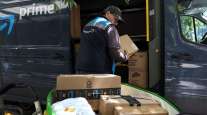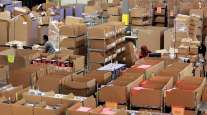Last-Mile Delivery Fleets Navigate Challenges of COVID-19 Pandemic

[Ensure you have all the info you need in these unprecedented times. Subscribe now.]
With more consumers shopping from home during the coronavirus pandemic, final-mile delivery providers have been dealing with a spike in demand for their services while implementing health and safety protocols designed to protect their employees and customers.
“We’ve seen an increase in e-commerce orders and shipments — and we expect this to continue,” FedEx spokesman Jonathan Lyons said.
Each of FedEx’s operating companies has developed business plans to meet this higher demand, he said. “FedEx Ground continues to experience significant residential volume at peak-like levels,” Lyons noted. “We are proactively taking steps, similar to what we do during the peak season.”
Once the pandemic hit, online shopping — including groceries — boomed.

Bezos
E-commerce giant Amazon.com reported $75.5 billion in first-quarter sales, up 26% from a year earlier. However, meeting that demand caused a drop in profits.
Amazon founder and CEO Jeff Bezos said he expects second-quarter operating profit to reach more than $4 billion, but warned shareholders that the company intends to invest those earnings into its response to the pandemic.
“These aren’t normal circumstances,” Bezos said. “Instead, we expect to spend the entirety of that $4 billion, and perhaps a bit more, on COVID-related expenses getting products to customers and keeping employees safe.”
Bezos explained this investment will cover personal protective equipment, enhanced cleaning of facilities, effective social distancing measures, higher wages for hourly teams and development of Amazon’s COVID-19 testing capabilities.
Ahold Delhaize, the Netherlands-based food retailer that owns several U.S. supermarket chains and online grocery delivery company Peapod, reported 42% growth in online sales in the United States during the first quarter.
Ahold said it is raising its target for U.S. online sales growth for the year to more than 50%, up from an earlier target of 30%.
The company also said it was “accelerating timelines for new home delivery fulfillment centers,” and acquired three warehouses from C&S Wholesale Grocers, a distributor based in Keene, N.H.
In February, Ahold closed its Peapod operation in the Chicago area, a move that resulted in the layoff of 500 employees, including 100 drivers. Peapod’s online shopping in that market had depended on fulfillment centers.
In the East, Peapod connects to the supply chain for Ahold-owned supermarket chains Food Lion, Giant and Stop & Shop.
Social Distancing
Meanwhile, final-mile operators such as XPO Logistics Last Mile have embraced “contactless delivery.”
“Consumers can let us know where they want their order placed — on the porch, curbside, in the garage, or at another location,” Daniel Walsh, president of XPO Last Mile, said in a blog post.
“We use text alerts and email to update consumers of their delivery status," he continued. "We arrive, and our team performs the delivery while taking the appropriate safety measures. Once we’ve placed an item in its requested location, we take a picture as verification of the delivery, no signature required.”

An XPO Logistics van. The company has embraced contactless delivery by using texts and emails to let a consumer know the status of his or her order. (John Sommers II for Transport Topics)
Walsh noted that large appliances such as refrigerators, ovens and washing machines are deemed essential goods. He said the company is still offering in-home delivery and installation services — “with the proper PPE.”
XPO ranks No. 3 on the Transport Topics Top 100 list of the largest for-hire carriers in North America and No. 1 on the Transport Topics Top 50 list of the largest logistics companies.
Other final-mile delivery companies also have modified their procedures.
For instance, UPS has added space between work stations in its facilities and suspended requirements that customers sign for packages. FedEx also no longer requires signatures for most deliveries to help employees and customers adhere to social distancing guidelines.
The pandemic has pushed the use of software that can help final-mile companies as well as other operators edge closer to paperless processes, said Brian Belcher, chief operating officer and co-founder of San Francisco-based software company Vector.
The company is rolling out an app for electronic bills of lading.

Stevens Transport is among the companies that has had to adjust its operations during the pandemic. It has begun using a Vector app for electronic bills of lading to decrease the amount of paperwork being passed back and forth. (Stevens Transport)
Stevens Transport, with a fleet of 2,500 tractors and nearly 4,000 refrigerated trailers, has used the app for a couple of months, said Robert Solimani, a vice president at the fleet.
Use of the electronic bills of lading “has been a very big topic of discussion since COVID-19 happened,” Solimani said, “with a lot of shippers and receivers leery of passing paperwork back and forth.”
Stevens Transport has taken a number of steps designed to address drivers’ health and safety as they work during the pandemic, Solimani said, including holding safety meetings over Zoom and having bottles of hand sanitizer and Lysol available.
Most shippers and receivers have adjusted their procedures, too, he noted.
The company provides bandannas bearing the Stevens Transport logo for drivers to wear as masks. Solimani noted that drivers can’t come into the shipping office.
“You have to have a mask on,” he said. “You have to have gloves on. You have to stay inside your truck.”
Stevens Transport, based in Dallas, ranks No. 51 on the for-hire TT100.

UPS suspended requirements that customers sign for packages. (UPS Inc.)
UPS also distributes protective equipment to employees, including masks and disposable gloves.
“We strongly recommend that our employees wear masks or face coverings, and we have provided our employees with the guidelines to properly use them,” UPS spokesman Matt O’Connor said. “We follow all government directives that require the use of masks or face coverings.”
UPS regularly replenishes supplies at its facilities, he said, including hand soap, hand sanitizer and wipes. “Disinfecting wipes are extremely limited in the supply chain,” O’Connor said, “but we have other bleach disinfecting solutions in place.”
UPS employees who experience symptoms such as fever or respiratory infection are required to seek medical treatment, O’Connor noted. “We do not want them to come to work if they are sick.”
UPS provides up to 10 days of compensation for any employee who is diagnosed with the virus, or who is required to quarantine, or if a household member is diagnosed with the virus and the employee is required to quarantine.
Fleet operators said they communicate frequently with employees about behaviors to manage health risks, as recommended by the Centers for Disease Control and Prevention and the World Health Organization, among other sources.
Cleaning and disinfecting facilities and equipment, including trucks, is part of the new routine.
“Our vehicles and equipment are cleaned and disinfected daily with an emphasis on the interiors and frequent exterior touch points, and we are providing our employees with supplies so they can wipe down their work surfaces and vehicles throughout the day,” O’Connor said.

FedEx distributes protective equipment to employees, including masks and disposable gloves. (FedEx)
FedEx provides supplies across its network to assist with hygiene, Lyons said, including re-stocking facilities with cleaning supplies, disinfecting wipes, hand sanitizer, masks, latex gloves and thermometers.
Workforce Increases
With the heightened volume of orders has come the need for more workers, though not in all cases. FedEx, which is accustomed to increased hiring for the busy pre-holiday season, has been putting that experience to use.
“We regularly ramp up and scale back our recruiting based on business needs,” Lyon said. “We continue to hire.”
FedEx ranks No. 2 on the for-hire TT100 and No. 15 on the TT Logistics 50.
While Amazon is reported to have hired some 175,000 warehouse workers during the March-April period, UPS’ hiring needs are relatively flat, according to O’Connor, with some areas of the country tighter than others.
“In general, we are only hiring where attrition is a factor — students graduating and moving on from our part-time positions or retirements in the full-time driving ranks,” he said.
UPS ranks No. 1 on the for-hire TT100 and No. 2 on the TT Logistics 50.
Want more news? Listen to today's daily briefing:




